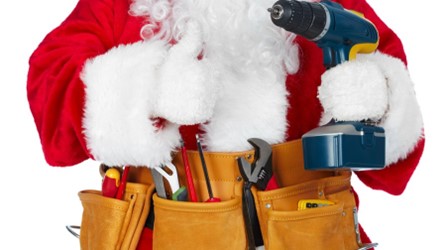HR expert explains your rights if you’re asked to work over Christmas

The festive season is approaching,
and while it is traditionally a time to celebrate and relax, sadly
for many workers that isn’t always the case.
Recent
research by IronmongeryDirect,
the UK’s largest supplier of specialist ironmongery, found that more than a fifth (21%) of UK tradespeople will work on Christmas Day this year,
mainly due to the cost of living crisis, and almost a third (31%) are
taking less time off than in previous years.
But what if you don’t want to work on the bank holidays?
What if you’d like a break between Christmas and New Year?
IronmongeryDirect
spoke to Liz Sebag-Montefiore, director and co-founder of
HR consultancy
10Eighty,
to explain what to do if your employer asks you to work over the festive period.
Check your contract
“If
you have a contract, read it closely to see exactly what you’ve signed up to. An employer does not have to give you time off on bank or public holidays if they are not
included in your holiday entitlement. This applies to both part-time and full-time workers.
“If
a bank holiday is on a day that
you do not usually work, your employer cannot make you use that day as part of your holiday entitlement.”
Communicate with your manager
“Communication
is key. Don’t make assumptions. If you want your manager/employer to be reasonable, then you
need to be reasonable too.
“Your
employer should be planning and communicating schedules in good time. Talk to your manager and don’t leave it until the last minute to ask for time off.
If others have already requested
leave, you may be out of luck.
“They
can’t discriminate, but you’d have to prove
that
you were treated differently to others. There should be no favouritism from your employer
when deciding. It’s not, for instance, fair to say
that working parents have
priority on holiday requests.
“If
you are rostered to work and want to take holiday, you may be able to swap your shift if you can find a co-worker willing to swap, but your employer doesn’t have to allow this, so
make sure you check
with them first.”
Consider the consequences
“Being
agreeable about the holiday roster
could help you earn the favour of management, as by being flexible, you’re making their lives
easier.
“If
you have a good reason to ask for a schedule change, you’re more likely to be accommodated if you are generally cooperative and agreeable about such matters. Depending
on your contract, if you offer to work an unpopular shift, you might be able to negotiate time in lieu.
“If
you decide to say ‘no’ to a request to work on specific day, you have to
accept the consequences.
“In
some industries, it’s essential for at least some staff to be working on every single day of the year. In these cases, it’s
not unreasonable for an employer to ask you to work –
it all
depends on your role.






